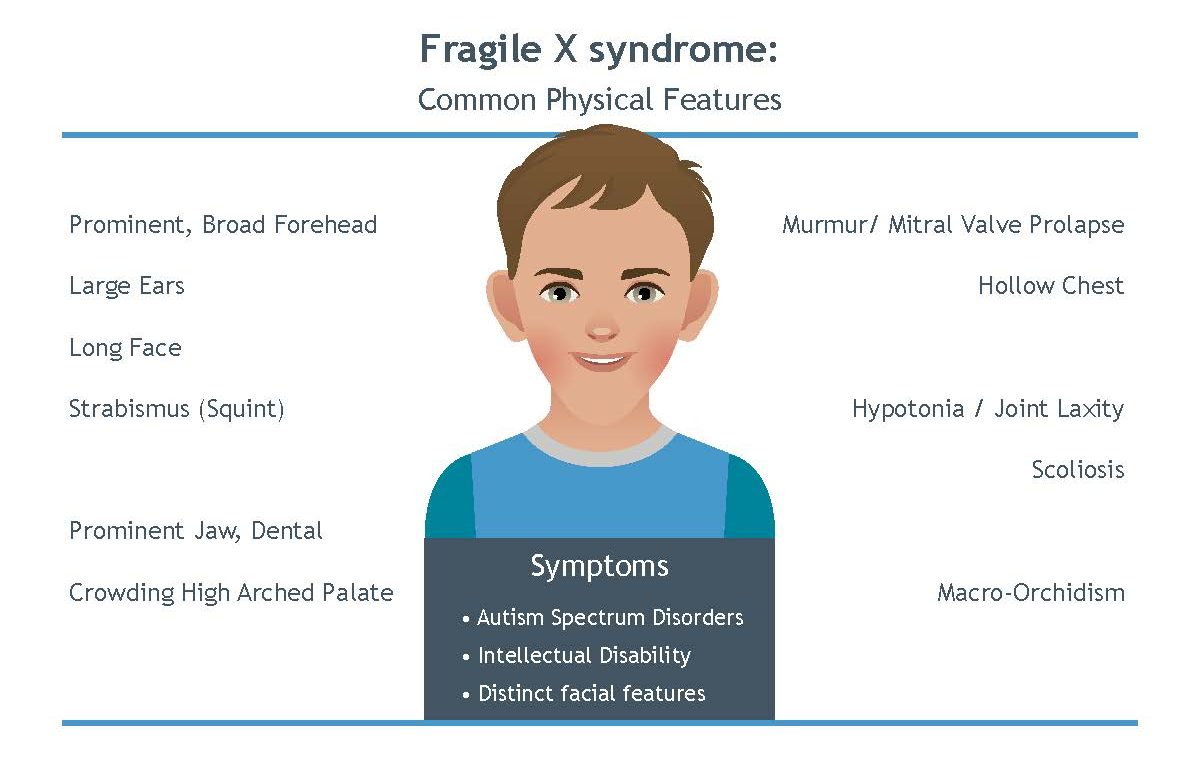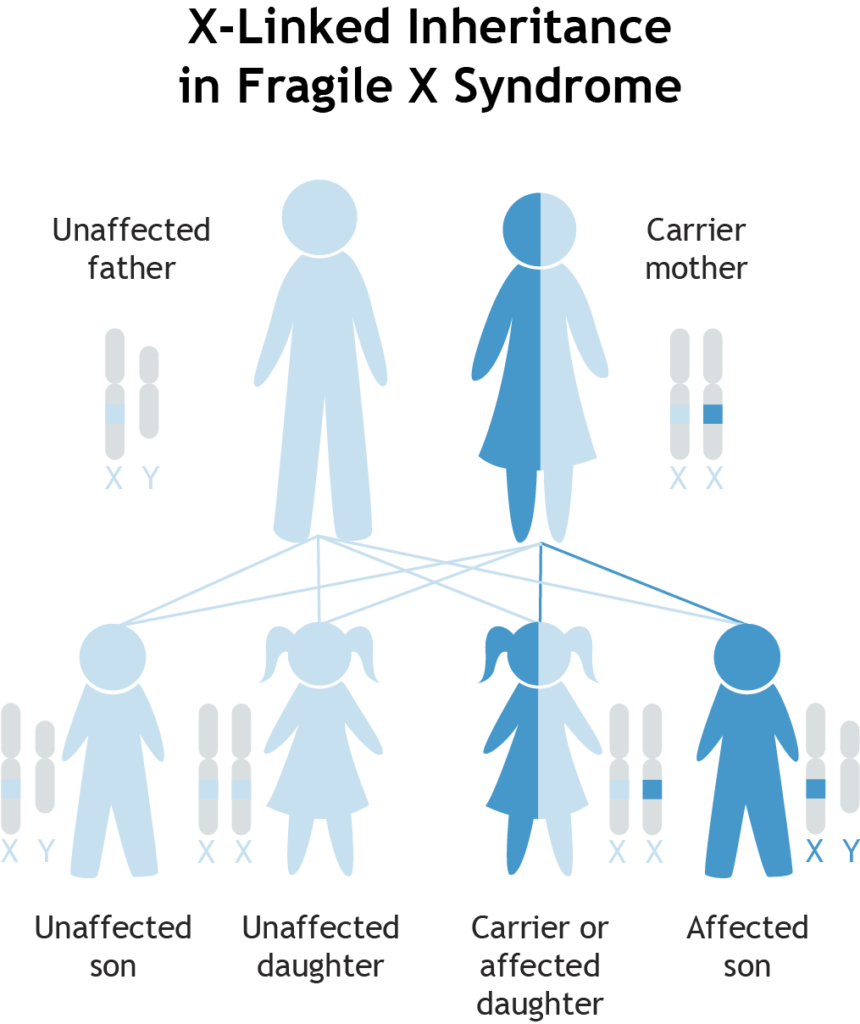Fragile X Syndrome Testing – Patients and Family
Fragile X Syndrome
What is fragile X syndrome?
Fragile X syndrome is an inherited, genetic disorder associated with a wide range of symptoms, including learning and behavior challenges. Children and adults with fragile X syndrome can have difficulty learning and intellectual disability. Speech and language is often delayed in young children until they are at least two years old. People who have fragile X syndrome may also have autism spectrum disorder or autistic-like behaviors such as anxiety, attention-deficit disorder (ADD), and attention-deficit hyperactivity disorder (ADHD). Autism is complex, and people with autism may have difficulty with communication and relating to others. Physical features that are often associated with fragile X syndrome are:
What causes fragile X syndrome?
Fragile X syndrome is caused by a unique sequence of DNA in the fragile X gene. The fragile X gene, FMR1, also known as (Fragile X Messenger Ribonucleoprotein 1 gene 1), is on the X chromosome, and fragile X syndrome gets its name from the way that the X chromosome looks under a microscope: bent and fragile looking.
The bend in the X chromosome is caused by a large piece of DNA that is unique to people with the condition. This genetic sequence is actually made up of a short sequence of DNA (also known as a “CGG triplet”) that is repeated hundreds of times. Because it is repeated so many times, the DNA sequence becomes very large and unstable, causing the fragile X gene to be turned off. If the fragile X gene is inactive, then the gene will not produce an important protein called FMRP. When a person has fragile X syndrome, their body cannot make enough of the FMRP. This protein supports brain development and, without this protein, people may have difficulty learning, intellectual disability, and behavior problems.
Genetic testing can determine the size of the DNA sequence. If a person has a normal gene, then the CGG triplet is repeated less than 45 times. If a person has a full mutation, then the CGG triplet is repeated more than 200 times and the person would have a molecular diagnosis of fragile X syndrome. If the individual has between 55 and 200 CGG triplets, the person is designated as having a premutation. People with premutations do not have fragile X syndrome but they may have health issues especially as they get older. Women with the premutation are also at increased risk for passing along fragile X syndrome to their children.
Both females and males can have fragile X syndrome, though symptoms are usually milder in females. Since females have two X chromosomes, and therefore two fragile X genes, they can make FMRP protein from a normal gene even if they have a full mutation gene.
Fragile X syndrome can be inherited from people who do not have the disease or may not present any symptoms, so it is recommended that women thinking about starting a family know their carrier status before getting pregnant. For testing recommendations and more information for prospective parents, click here
How many people have fragile X syndrome?

Premutation-associated disorders
Adults with a small mutation, called a premutation, in the fragile X gene may have distinct symptoms that become more apparent as a person ages.
FX-associated tremor ataxia syndrome (FXTAS)
Fragile X-associated tremor/ataxia syndrome, abbreviated as FXTAS, is caused by a premutation in the fragile X gene. Symptoms can include difficulty with balance and walking (ataxia), cognitive decline, tremors and Parkinsonism-like symptoms. Although both women and men can have FXTAS, symptoms are more common in men than women. Approximately 40% of men with a premutation can develop FXTAS after the age of 50 years old. FXTAS is commonly misdiagnosed as Parkinson’s disease because some of the symptoms are similar. Genetic testing can help with a diagnosis of FXTAS.
FX-associated primary ovarian insufficiency (FXPOI)
Women who have a premutation are at risk for fragile X-associated primary ovarian insufficiency (FXPOI). Common symptoms of FXPOI include irregular menstrual cycles and early menopause by the time they reach 40 years of age. Some women may become infertile, but some women who have FXPOI can still get pregnant. FXPOI is common in women with premutations, with 20-25% of these individuals experiencing symptoms. Genetic testing can help with a diagnosis of FXPOI.
About 1 in 470 males and 1 in 150 females are fragile X carriers*, so it is important to know if you are a carrier if you plan to have children.
Genetic testing for Fragile X syndrome and premutation-associated disorders
Is genetic testing available?
Yes, genetic testing is available for fragile X syndrome and fragile X associated-disorders. In February of 2020, the first laboratory test to aid in the diagnosis of fragile X syndrome and premutation-associated disorders, as well as for fragile X carrier screening, was cleared by the United States Food and Drug Administration (FDA). The test is called AmplideX® Fragile X Dx & Carrier Screen Kit and was developed by Asuragen, Inc.
Discuss testing options with your healthcare providers and ask if they are aware of the AmplideX test.
What do the test results mean?
Genetic test results can aid in the diagnosis of fragile X syndrome or premutation-associated disorders. The results will identify if there is a full mutation or premutation in the fragile X gene. Assay results are solely intended to be interpreted by healthcare professionals who are board certified in molecular genetics and to be used in conjunction with other clinical and diagnostic findings, consistent with professional standards of practice. Reflex testing, clinical genetic evaluation, and genetic counseling should be offered as appropriate.
After a person is diagnosed with fragile X syndrome or premutation-associated disorders, specific intervention strategies may be recommended to overcome challenges and improve outcomes. There is currently no cure for fragile X syndrome or premutation-associated disorders, but researchers are making advances in behavioral strategies and treatments that may be recommended for future disease management.
Resources
Where can I find out more information about fragile X and premutation-related disorders?
Below is a list of support groups and professional organizations that may be helpful to you and your family.
National Fragile X Foundation | www.fragilex.org
1861 International Drive, Suite 200
McLean, VA 22102
Phone: 800-688-8765
E-mail: contact@fragilex.org
Fragile X Clinical and Research Consortium | https://fragilex.org/research/
FRAXA Research Foundation | www.fraxa.org
10 Prince Place
Newburyport, MA 01950
Phone: 978-462-1866
E-mail: info@fraxa.org
Genetic and Rare Diseases Information Center | www.rarediseases.info.nih.gov/gard
P.O. Box 8126
Gaithersburg, MD 20898-8126
Phone: 888-205-2311
E-mail: rarediseases@info.nih.gov
National Society of Genetic Counselors | www.nsgc.org
330 N. Wabash Avenue, Suite 2000
Chicago, IL 60611
Phone: 312-321-6834
E-mail: nsgc@nsgc.org
The Fragile X Society | www.fragilex.org.uk
(United Kingdom)
Rood End House, 6 Stortford Road
Great Dunmow, Essex CM6 1DA
Phone: 00 44 (0)1371 875100
E-mail: info@fragilex.org.uk
FAQ
My child has autism or has developmental delays. Should they be tested for fragile X syndrome?
There are many causes of autism, but a full mutation in the fragile X gene is the most common known genetic cause of autism. To learn if you child’s autism is related to fragile X syndrome, please consult your healthcare provider about fragile X syndrome testing.
How can I have my child tested for fragile X syndrome?
Genetic testing for fragile X syndrome can be ordered by your child’s healthcare provider.
How is fragile X syndrome diagnosed?
Healthcare providers can diagnose fragile X syndrome based on genetic testing results and clinical symptoms.
Is there an FDA-cleared test for fragile X diagnosis and carrier screening?
Yes, there is an FDA-cleared test for fragile X diagnosis, fragile X premutation-associated disorders, and carrier screening.
How common is fragile X syndrome?
FXS affects approximately one in 3,600 to 4,000 males, and one out of 4,000 to 6,000 females.*
Do people who are carriers of fragile X have symptoms?
Adults who are carriers of fragile X may or may not have symptoms associated with fragile X premutation-associated conditions, such as fragile X-associated tremor ataxia syndrome (FXTAS) premutation-associated disorders or fragile X-associated primary ovarian insufficiency (FXPOI). Carriers with fragile X premutations do not have fragile X syndrome.
Can I tell if I am a carrier by my symptoms?
The only way to determine if you are a carrier is to get a fragile X genetic test.
How is fragile X linked to autism?
Fragile X syndrome is the leading genetic cause of autism, but not everyone with autism has fragile X syndrome. There are similarities in the way the brain works in people with autism and people with fragile X syndrome. That similarity is helping researchers understand autism even better and leading the search for targeted drugs for individuals with fragile X syndrome, including those who also have autism.
Is there a cure for fragile X syndrome?
There is currently no cure for fragile X syndrome or premutation-associated disorders. There are, however, patient management approaches for those with fragile X syndrome and these can be distinct from approaches used with those with idiopathic autism and other disorders causing developmental delay.
Should someone with trouble walking or balancing or similar symptoms of ataxia be tested for a fragile X premutation?
There are many conditions that can cause difficulty with walking, balance, or ataxia, and these symptoms are features of fragile X-associated tremor ataxia syndrome (FXTAS), and usually occur after the age of 50 years old. Discuss this with your healthcare provider. If this is a sudden onset, seek care as soon as possible.
Where can I be tested?
To find out about testing options, follow up with the appropriate healthcare provider, physician, obstetrician, gynecologist, or pediatrician, neurologist, and/or genetic counselor.
Fragile X Syndrome Testing – Patients and Family
Footnotes
-
*




